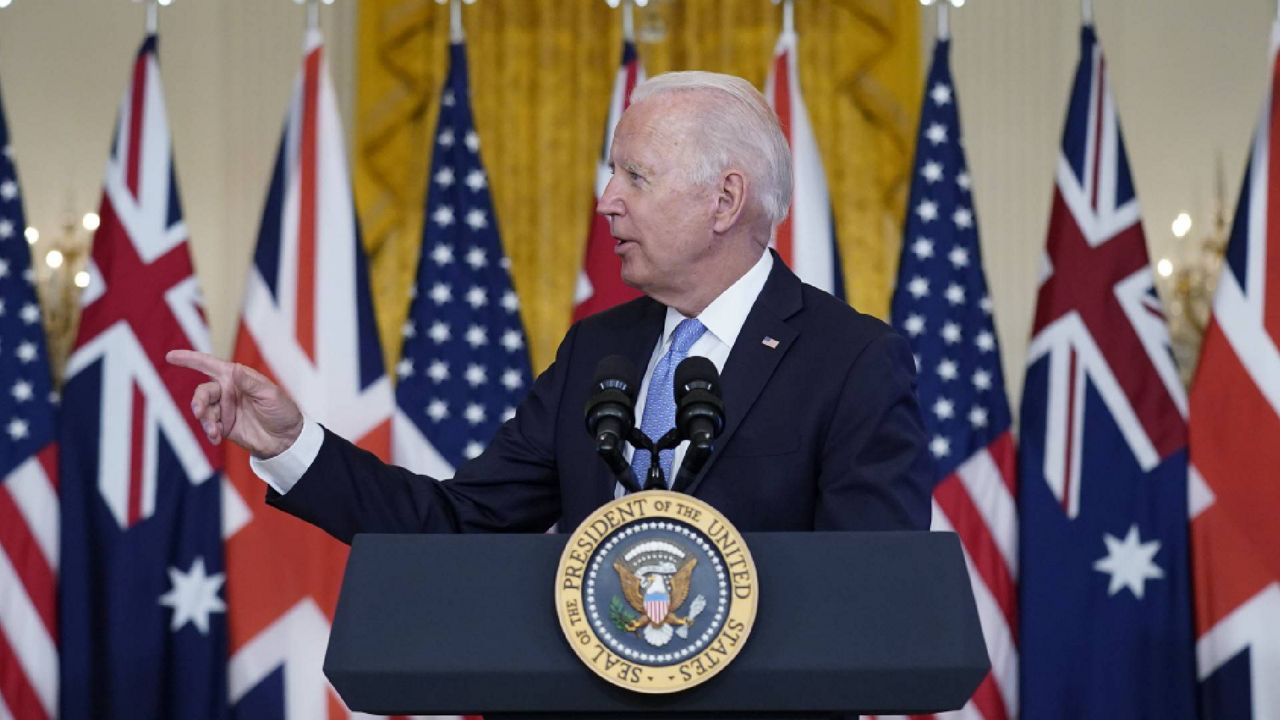The Biden administration on Wednesday announced a new trilateral security partnership between the United States, United Kingdom and Australia focused on maintaining peace and stability across the Indo-Pacific region, which encompasses the countries located in the Pacific Ocean and Asia, notably including China.
President Joe Biden spoke about the new defense-focused relationship on Wednesday afternoon from the White House as Prime Minister Boris Johnson joined him by video from the U.K., where it was late evening, and Prime Minister Scott Morrison appeared virtually from early morning in Australia.
"Today we're taking another historic step to deepen and formalize cooperation among all three of our nations," the president said. "We all recognize the imperative of ensuring peace and stability in the Indo-Pacific over the long term."
The three countries will focus on security by joining together on things like defense technology, cybersecurity, artificial intelligence, quantum technology and undersea capabilities, including nuclear-powered submarines, the president said. He added that details of the agreement would be worked out over the next 18 months.
The new alliance, named AUKUS to represent each country, comes as the Biden administration moves to focus on China as an emerging defense priority and as they also affirm partnerships in Asia.
The leaders of Japan and South Korea were the first to visit the White House for bilateral meetings with President Biden this year, and leaders of the Quad — the U.S., Australia, India and Japan — will meet in person in Washington next week for the first summit of its kind.
Asked about the implications of AUKUS for China, senior administration officials described it on Wednesday as not targeted at any one country but instead a “larger effort to sustain the fabric of engagement and deterrence” in the Indo-Pacific region.
"Our defense forces are all working together to deliver a safer and more secure region that ultimately benefits us all," said Australian Prime Minister Morrison.
Ahead of the announcement, Secretary of State Antony Blinken met with Australian Foreign Minister Marise Payne on Wednesday in Washington, and they were scheduled to meet again on Thursday with Secretary of Defense Lloyd Austin and his Australian counterpart, Defense Minister Peter Dutton.
“This is a fundamental decision — fundamental — that binds decisively Australia to the United States and Great Britain for generations,” an administration official said earlier Wednesday, noting previous decades of cooperation between the three countries.
The U.S and U.K. leaders also announced their support for Australia to develop nuclear-powered submarines.
"It is a momentous decision for any nation to acquire this formidable capability," said Prime Minister Johnson.
The new technology will allow their submarines to deploy for a longer period of time using quieter and more capable machines, officials said, and Australia has committed not to pursue nuclear weapons.
"I want to be exceedingly clear about this. We're not talking about nuclear-armed submarines. These are conventionally-armed," President Biden stressed.
The president thanked both leaders for their friendship and their leadership, saying: "I look forward to seeing both of you in person very soon, I hope."
“I think this might be just the first step,” said John Schaus, who worked on Asian and Pacific security for the Office of the Secretary of Defense under former president Barack Obama.
“The world is looking to come together in new ways, new configurations to sustain patterns of engagement and cooperation that they have found helpful for the past several generations,” said Schaus, now a senior fellow for the International Security Program at the Center for Strategic and International Studies.
Schaus described a core U.S. objective in the Indo-Pacific as the free flow of imports and exports in the region, even as powers like China seek to dominate competition.
“It's hard to be prosperous without Asia,” he said.
One senior administration official outlined the region in a similar way in a call with reporters Wednesday, saying: “The most dynamic, commercial, economic, most vibrant region in the world is the Indo-Pacific. But that vibrancy, that dynamism rests on confidence and peace and stability.”



